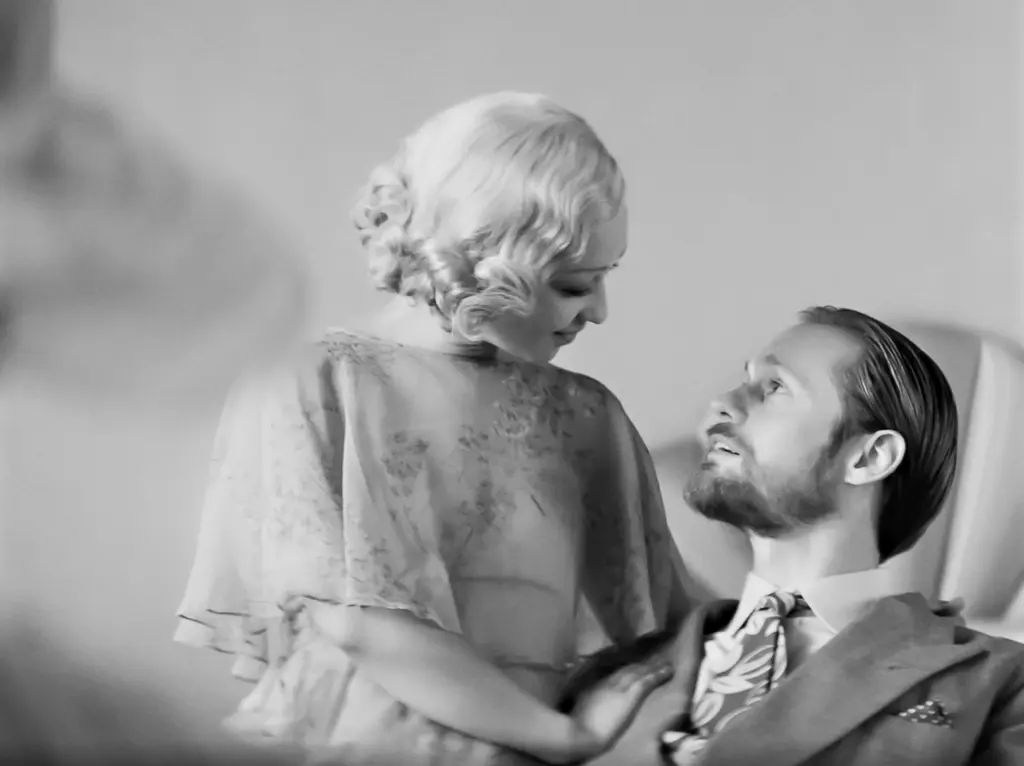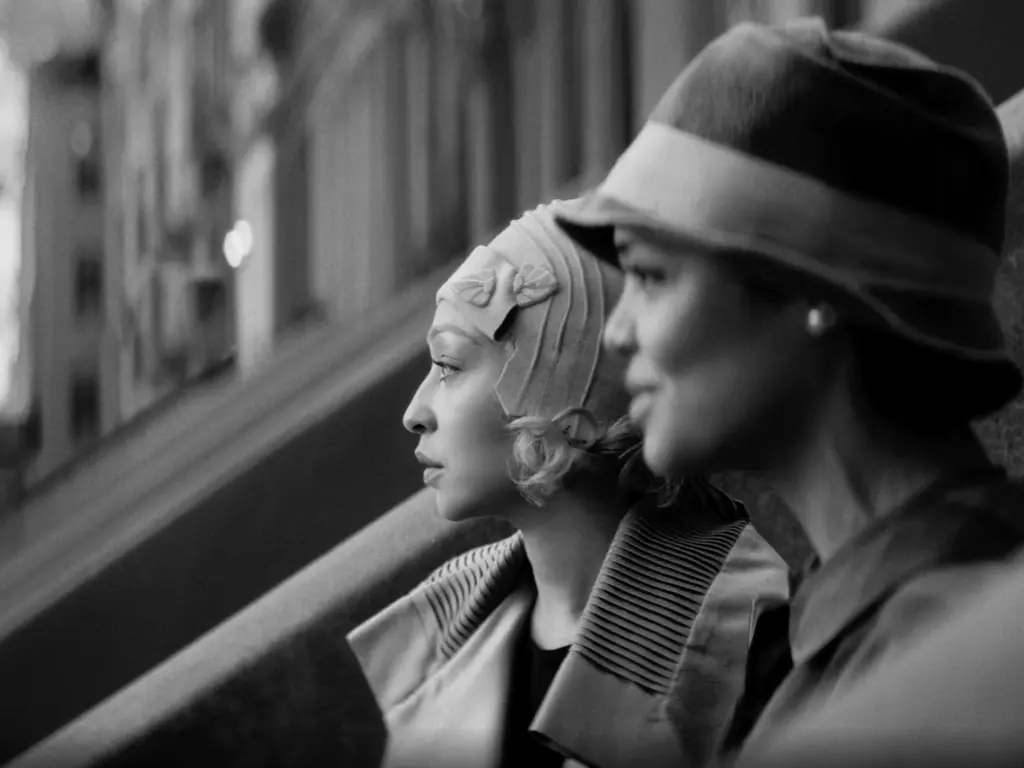Race, colourism and radical storytelling: Rebecca Hall and Ruth Negga on Passing

Image courtesy of Netflix.
Rebecca Hall’s adaptation of Nella Larsen’s 1929 novel sparked heated debate before it was even released. Here, the actor-turned-director and the film’s star explain why the story still resonates today.
Culture
Words: Olive Pometsey
“When I grew up, I was always looking at her. I kind of always thought that she looked Black.”
So says Rebecca Hall of her mother, opera singer Maria Ewing. Having starred in films for almost two decades, from Christopher Nolan’s The Prestige in 2006 to this year’s Godzilla vs. Kong, the Londoner is explaining why she chose to adapt, for her directorial debut, Nella Larsen’s Passing. The 1929 novel revolves around the idea of someone of one racial group being accepted or perceived – passing – as a member of another.
“When I tried to talk to her about it,” she continues, “I got confused responses. And I say that with compassion, because the legacy of passing in a family is that the family protects the imperatives of their parents. That’s what a child does.”
In her case, Ewing was protecting her father, a man of mixed ethnicity who passed as white in Detroit, Michigan during the 1900s.
“I was like: OK, my parents don’t want to talk about it, they never admitted it, so I guess that’s what I have to do too,” says 39-year-old Hall. But, 13 years ago, she came across Larsen’s novel. “It was like a door opened to history for me. It gave me context. It gave me language that I didn’t have, words like ‘passing’. I was like: obviously that’s what my grandfather was doing.”
Shot in black and white, and starring Ruth Negga and Tessa Thompson, Hall’s adaptation of Passing is a quietly haunting tale of two white-passing mixed race women, Clare and Irene in 1920s America. Childhood friends, the pair unexpectedly reunite as adults, while both passing in an upper class New York tea room.
For Irene (Thompson), the iced tea pitstop is a momentary illusion required for her to blend into the white establishment. At home and in her daily life, she’s proud of her Blackness and is a pillar of the community. She just needs to pass to be served. But for Clare (Negga), it’s a sustained charade: her husband, her children and her middle class friends all believe she is white. With blonde hair, confidence and charisma, Clare blends in without suspicion, laughing at her husband’s racist jokes and enjoying the luxuries perceived whiteness affords her. But upon reuniting with Irene, she realises that something is missing.
“The interesting thing about passing is that nothing changes, people don’t change their appearance that much,” says 39-year-old Ethiopian-Irish actor Negga, when I talk to her and Hall in a central London hotel. “They change the milieu that they move in and get absorbed into that, and so that’s how they pass. It’s almost too easy.”
In many ways, the act of passing only highlights the absurdity of race as a social construct. It’s the ultimate transgression in a society that perpetuates a racial hierarchy. And Negga is well aware of this aspect of her character.
“Race is a simple concept, but it’s just been made so complex by money and power. This modern idea of race was invented to keep a whole group of people in its place,” continues Negga. “That all of a sudden, people will treat you differently, just because you’re moving in a different circle, because they’re seeing something differently [shows the ridiculousness of it]. It’s all about perspective.”
RUTH NEGGA
When the trailer for Passing was released in September, it sparked online debate about casting, with many arguing that Negga and Thompson wouldn’t be able to convincingly pass as white in real life.
It’s true that both actors may have slightly darker complexions to those described in the book, but as Nylah Burton argued for Refinery29, “within the knee-jerk reaction [online] is also the nuance”. At first, Clare looks white to Irene because she is in a white space.
“People weren’t expecting a Black person in that environment because there were laws, and the threat of violence was very, very real,” explains Negga. “And so it was taken for granted that Black people wouldn’t enter the space. I don’t think people expected them to have the fucking balls.”
It’s not until Irene recognises Clare as a childhood friend that the fantasy is broken and she begins to notice a familiar Blackness. Yet it’s difficult for audiences to unsee Negga and Thompson as Black, because we already recognise them as such.
The discussion around whether Negga could feasibly pass in the real world is also somewhat at odds with her own experience. She is unflinchingly proud of her mixed Black and Irish heritage, but working in a colourist and often downright racist industry, she’s acutely aware that, sometimes, those around her don’t truly recognise her Blackness.
“For me and, I think, a lot of mixed race girls in my industry, in the past I have definitely felt that we were the ‘acceptable Black people’, the dilution version. So where does that place me? It’s very conflicted. It’s constantly in the back of my mind. When I read scripts, I always think: ‘Is this for me?’ And colourism is part of that discussion with myself.”
On occasion, she adds, the colourism and disdain for Blackness within the film industry has been more overt. “I’m quite pale and I remember the first time someone said to me: ‘You’re not really Black.’ It was a fucking dagger to the soul and it made me fierce with anger. I was just so outraged that someone could say something like that. And it was meant as a compliment, that’s what killed me.”



Passing is not only significant for the ways in which it artfully unravels the concept of race. It’s also a nuanced study of the relationship between two Black women.
When she first read Larsen’s novel, she “couldn’t believe how modern it was,” says Hall. “Yes, there’s a white racist man in it, but it’s not really about something that he does to them. It’s about their relationship, their effect on each other, and how complicated that relationship is. Of course, it’s played out underneath these systems of white supremacy and patriarchy, and all these things inform how that relationship is complicated. But we’re still seeing it through the two of them looking at each other.
“To me, that felt radical for now, let alone 1929.”
If the story of Passing remains radical almost a century after Larsen’s novel was first published, what can we learn from it in 2021?
“I mean, kind of everything,” replies Hall with a laugh. “I think when the book came out, it was celebrated, but it was also maligned. People didn’t get it. They reduced it to a very straightforward tale of adultery, about a bad woman who passes and a morally righteous woman who doesn’t. That couldn’t be further away from what Larsen’s trying to do.
“But now, through the lens of studies and thinking about things like intersectionality, we have a more sophisticated understanding of how these things weave together.”
The film certainly feels particularly pertinent now, as the world attempts to the heal centuries-old wounds of racism with a long-overdue urgency in the wake of the murder of George Floyd last year. What Passing reveals is why we keep picking at the scabs. The concept of race is so embedded in every aspect of society and our identities that we can’t detach our reality, ourselves, from it. As Negga puts it: “We’ve fully fucking drank the Kool-Aid.”
Or, as Irene observes in the film: “Everyone is passing for something.”
Passing is in cinemas now and will be available on Netflix from 10th November.




